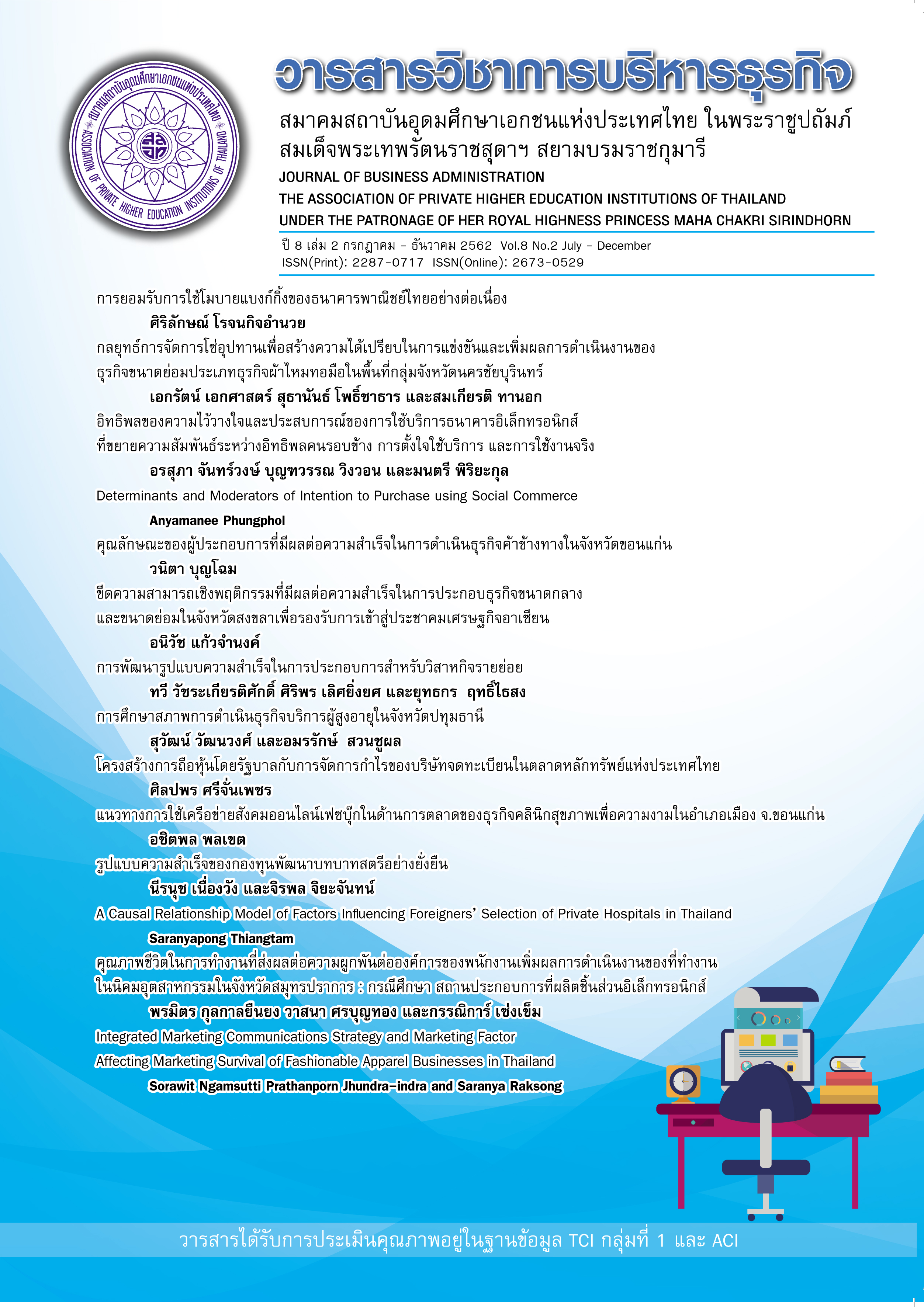Government Ownership and Earnings Management in Thai Listed Companies
Keywords:
Government Ownership, Earnings ManagementAbstract
The aim of this research was to analyze the relationship between government ownership
and earnings management. The samples for this research included 1,181 observations of Thai listed
companies from 2016 to 2018. Multiple regression were used to analyze the data and test the
hypothesis. The result of this study showed that government ownership was positively associated
with earnings management. This research contributes to regulators to adjust the corporate governance
criteria. In addition, investors have fundamental information for decision making.
References
Ali, A., & Zhang, W. (2015). CEO Tenure and Earnings Management. Journal of Accounting and Economics, 59, 60-79.
Ang, J. S., & Ding, D. K. (2006). Government Ownership and the Performance of Government-Linked Companies: The Case of Singapore. Journal of Multinational Financial Management, 16, 64-88.
Belkaoui, A. (2004). Politically-connected firms: are they connected to earnings opacity? Research in Accounting Regulation, 17, 25-38.
Berkeley, J. (2010). Chinese Acquisitions: China Buys up the World. The Economist. Retrieved from https://www.economist.com/leaders/2010/11/11/china-buys-up-the-world.
Blom, M. (2009). The Effect of the Implantation of IFRS on the Level of Earnings Management. Master thesis. Erasmus University Rotterdam Faculty of Economics and Business, Netherlands.
Borisova, G., Brockman, P., Salas, J., & Zagorchev, A. (2012). Government Ownership and Corporate Governance: Evidence from the EU. Journal of Banking & Finance, 36(11), 2917-2934.
Burns, N., & Grove, S. K. (1993). Study the Practice of Nursing Research: Conduct, critique & utilization.(4thed). Philadelphia: W. B. Saunders Company.
Chaney, P.K., Faccio, M., & Parsley, D. (2011). The quality of accounting information in politically connected firms. Journal of Accounting and Economics, 51(1), 58-76.
Capalbo, F., Frino, A., Mollica, V., & Palumbo, R. (2014). Accrual-based Earnings Management in State Owned Companies Implications for Transnational Accounting Regulation. Accounting, Auditing & Accountability Journal, 27(6), 1026-104
Cuervo, A., & Villalonga, B. (2000). Explaining the Variance in the Performance Effects of Privatization.
The Academy of Management Review, 25(3), 581-590.
Cullinan, C.P., Wang, F., Wang, P., & Zhang, J. (2012), Ownership Structure and Accounting Conservatism in China. Journal of International Accounting, Auditing and Taxation, 21(1), 1-16.
Dechow, P. M., & Skinner, D. J. (2000). Earnings Management: Reconciling the Views of Accounting Academics, Practitioners, and Regulators. Accounting Horizons, 14(2), 235–250.
Dechow, P. M., Sloan, R. G., & Sweeney, A. P. (1995). Detecting Earnings management. The Accounting Review, 70, 193-225.
Ding, Y., Zhang, H., & Zhang, J. (2007). Private vs. State Ownership and Earnings Management: Evidence from Chinese Listed Companies. Corporate Governance: An International Review, 15(2), 223-238.
Gaio, C., & Pinto, I. (2018). The Role of State Ownership on Earnings Quality: Evidence across Public
and Private European Firms. Journal of Applied Accounting Research, 19(2), 312-332. https://doi.org/10.1108/JAAR-07-2016-0067
Gonzalez, J.S., & Meca, E. G. (2014). Does Corporate Governance Influence Earnings management in Latin American markets? Journal Business Ethics, 121, 419–440
Hashmi, M. A., Brahmana, R.K., & Lau, E. (2018). Political Connections, Family Firms and Earnings Quality. Management Research Review, 41(4), 414-432.
Healy, P. M., & Wahlen, J. M. (1999). A Review of the Earnings Management Literature and its Implications for Standard Setting. Accounting Horizons, 13(14), 365–383.
Jensen, M., & Meckling, W. (1976). Theory of the Firm: Managerial Behavior, Agency Costs and Ownership Structure. Journal of Financial Economics, 3, 305-360.
Jones, J. J. (1991). Earnings management during import relief investigations. Journal of Accounting Research, 29(2), 193-228.
Lassoued, N., Attia, M. B. R., & Sassi, H. (2017). Earnings Management and Ownership Structure in Emerging Market: Evidence from Banking Industry. Managerial Finance, 43(10), 1117-1136. https://doi.org/10.1108/MF-11-2015-0312
Le, T. V., & Buck, T. (2011). State Ownership and Listed Firm Performance: A Universally Negative Governance Relationship? Journal of Management and Governance, 15, 227-248.
Leuz, C., Nanda, D., & Wysocki, P. D. (2003). Earnings management and investor protection: an international comparison. Journal of Financial Economics, 69(3), 505-527.
Liu, X., SaIdi, R., & Bazaz, M. (2014). Institutional Incentives and Earnings Quality: the Influence of Government Ownership in China. Journal of Contemporary Accounting and Economics, 10(3), 248-261.
Ng, A., Yuce, A., & Chen, E. (2009). Determinants of State Equity Ownership, and Its Effect on Value/Performance: China’s Privatized Firms. Pacific-Basin Finance Journal, 17(4), 413-443.
OECD. (2005). Guidelines on Corporate Governance of State-owned Enterprises, OECD Publications,Paris.
Pornsit, J., Miller, G. A., Yoon, S. S., & Kim, Y. S. (2008). Is Earnings Management Opportunistic or Beneficial? An Agency Theory Perspective. International Review of Financial Analysis, 17(3), 1–25.
Roychowdhury, S. (2006). Earnings Management through Real Activities Manipulation. Journal of Accounting and Economics, 42(3), 335–370.
Said, J., & Jaafar, N. (2014). Accountability in Government Linked Companies: An Empirical Finding. Procedia-Social and Behavioral Science, 145, 294-299.
Selahudin, N. F., & Nawang, D. (2015). The Impact of Government Ownership on Practices in Malaysian Public Listed Companies. Journal of Education and Social Sciences, 2, 115-120.
Suddaby, R., Gendron, Y., & Lam, H. (2009).The Organizational Context of Professionalism in Accounting. Accounting, Organizations and Society, 34(3-4), 409-427.
Vining, A.R., & Boardman, A.E. (1992). Ownership versus Competition: Efficiency in Public Enterprise. Public Choice, 73(2), 205-309.
Wang, L., &Yung, K. (2011). Do State Enterprises Manage Earnings more than Privately Owned Firms? The Case of China. Journal of Business Finance & Accounting, 38(78), 794-812.
Waweru, N., & Riro, G. (2013). Corporate Governance, Firm Characteristics and Earnings Management in an Emerging Economy. Journal of Applied Management Accounting Research, 11(1), 43-64.
Wei, Z.B., & Varela, O. (2003). State Equity Ownership and Firm Market Performance: Evidence from China’s newly Privatized Firms. Global Finance Journal, 14(1), 65-82.
Wei, Z.B., Xie, F.X., & Zhang, S.R. (2005). Ownership Structure and Firm Value in China’s Privatized firms: 1991-2001. Journal of Financial and Quantitative Analysis, 40(1), 87-108.
Yang, Y.J., Kweh, Q.L., & Lin. R.C. (2014). Earnings Quality of Taiwanese Group Firms. Asia-Pacific Journal of Accounting & Economics, 21(2), 1-23.
Yoon, S., Miller, G., &Jiraporn, P. (2006). Earnings Management Vehicles for Korean Firms. Journal of International Financial Management and Accounting, 17(2), 85-109.
Downloads
Published
How to Cite
Issue
Section
License
บทความที่ลงตีพิมพ์ในวารสารวิชาการบริหารธุรกิจ สมาคมสถาบันอุดมศึกษาเอกชนแห่งประเทศไทยต้องเป็นบทความที่ไม่เคยได้รับการตีพิมพ์เผยแพร่ หรืออยู่ระหว่างการพิจารณาตีพิมพ์ในวารสารอื่นๆ การละเมิดลิขสิทธิ์เป็นความรับผิดชอบของผู้ส่งบทความโดยตรง


